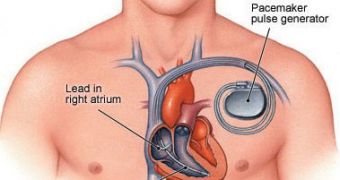Looking at a nice girl/boy or running for a few miles, and your heart goes wild.
But how does the heart recover its normal pace?
Scientists have discovered how we "put the brakes" on a racing heartbeat. A team at the University of Illinois at Chicago has discovered how an enzyme acts on the heart's pacemaker to slow down the rapid heartbeat induced by the adrenaline's "fight-or-flight" reaction.
Just one cell in the upper right chamber sets the rhythm of your heart, making its neighboring cells beat. The pacemaker cell of the human heart beats faster or slower determining a rhythmic heartbeat that rises or slows down the blood flow in the body which depends on our variable energy necessities while we eat, sleep or exercise. "Disturbances of pacemaker control are common in heart diseases. When the heartbeat becomes non-rhythmic and chaotic, it can result in fatal arrhythmias and stroke," said lead researcher Dr. R. John Solaro, director of the center for cardiovascular research and head of physiology and biophysics at UIC.
Common treatment of arrhythmia is made by removing tissue around a chaotic pacemaker, followed by the installation of a mechanical pacemaker. "Understanding the molecular regulation of the heart's pacemaker opens the possibility of less drastic treatment options, including drug interventions," said Solaro.
The team showed that an enzyme called Pak 1, abundant in the heart, has a crucial role in decreasing the pacemaker cell's sensitivity to the adrenaline and adrenaline-like chemicals. "The enzyme works through calcium and potassium channels that we know to be key players in the generation and regulation of the pacemaker activity," said first author Yunbo Ke, UIC research assistant professor of physiology and biophysics.
"Although adrenaline and other mechanisms that accelerate the heart rate have been well studied, mechanisms that might act as a brake are poorly understood. Identification of this previously unknown molecular mechanism for slowing the heartbeat may offer new avenues of diagnosis, drug design and treatment of many common heart diseases," said Solaro.
"Further, now that we know something of how this enzyme works in the pacemaker cell, we may discover it is involved in the regulation of other processes, particularly in the brain, where it is also highly expressed," added Ke.

 14 DAY TRIAL //
14 DAY TRIAL //